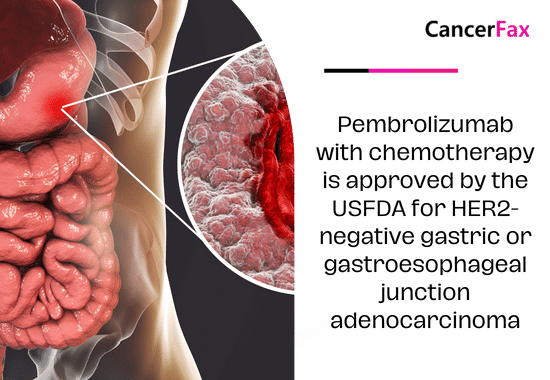The Food and Drug Administration approved pembrolizumab (Keytruda, Merck) in combination with fluoropyrimidine- and platinum-containing chemotherapy on November 16, 2023. This approval is for the initial treatment of adults with locally advanced unresectable or metastatic HER2-negative gastric or gastroesophageal junction (GEJ) adenocarcinoma.
The effectiveness was assessed in a multicenter, randomized, double-blind, placebo-controlled experiment called KEYNOTE-859 (NCT03675737). The trial included 1579 patients with HER2-negative advanced gastric or GEJ adenocarcinoma who had not undergone systemic therapy for metastatic illness before. Participants were randomly assigned to receive either pembrolizumab 200 mg or a placebo along with the investigator’s choice of combination chemotherapy, which included either cisplatin 80 mg/m2 plus 5-FU 800 mg/m2/day for 5 days (FP) or oxaliplatin 130 mg/m2 on Day 1 plus capecitabine 1000 mg/m2 twice a day for 14 days (CAPOX) in each 21-day cycle.
The primary efficacy measure was overall survival (OS). The study also evaluated progression free survival (PFS), overall response rate (ORR), and duration of response (DOR) through a blinded independent central review (BICR) based on RECIST v1.1 criteria, with a limit of 10 target lesions and 5 target lesions per organ.
Pembrolizumab combined with chemotherapy led to a statistically significant enhancement in overall survival (OS), progression-free survival (PFS), and objective response rate (ORR). The median overall survival was 12.9 months (95% CI: 11.9, 14.0) with pembrolizumab and 11.5 months (95% CI: 10.6, 12.1) with placebo. The hazard ratio (HR) was 0.78 (95% CI: 0.70, 0.87) with a p-value of <0.0001. The median progression-free survival (PFS) was 6.9 months (95% CI: 6.3, 7.2) and 5.6 months (95% CI: 5.5, 5.7) in the two groups, with a hazard ratio (HR) of 0.76 [95% CI: 0.67, 0.85] and a p-value of <0.0001. The objective response rate (ORR) was 51% (95% CI: 48, 55) and 42% (95% CI: 38, 45) with a statistically significant p-value of less than 0.0001 in the two treatment groups. The median duration of response (DOR) was 8 months (95% CI: 7.0, 9.7) for pembrolizumab and 5.7 months (95% CI: 5.5, 6.9) for placebo.
An additional study showed that patients who were given pembrolizumab and had tumors that expressed PD-L1 CPS > 1 and CPS ≥ 10 had statistically higher overall survival (OS), progression-free survival (PFS), and objective response rate (ORR).
15% of patients experienced permanent cessation of pembrolizumab treatment due to adverse effects. Adverse effects leading to permanent cessation in at least 1% of cases included infections and diarrhea.
The suggested dosage for pembrolizumab is 200 mg every 3 weeks or 400 mg every 6 weeks until disease progression or intolerable toxicity. Administer pembrolizumab before chemotherapy if they are given on the same day.


